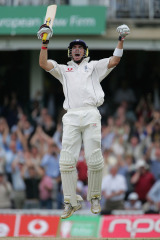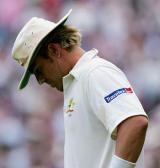
|

Drenched in champagne, Michael Vaughan holds the urn aloft
© Getty Images
|
|
"Is it the Ashes ... yes, it's the Ashes, England have won the Ashes!" Brian Johnston's immortal words have echoed around The Oval ever since they were uttered 52 years ago, when Denis Compton cracked the final boundary to bring the ultimate prize back home for the first time in 19 years. The 2005 homecoming was rather more of a mish mash as bad light, the one thing that had inched them ever-closer to victory over the weekend, returned to rob them of their definitive crowning moment.
The end, when it came, could not have been further from the fraught, frenetic, scramble for the line that we had been promised, and which we feared. Instead, The Oval was a carnival that gradually found its voice, then lost it temporarily amid the confusion. Hands that, mid-afternoon, had been preventing chins from slumping beneath the stands, were raised in unison to clap and cheer and do congas around the concourse. Hope and despair, those terrible tyrants, have ruled our summer with a Machiavellian glee, but today they were dispatched to the outer reaches of the kingdom. England have won back the Ashes. Only disbelief remains to confound us.
How much does this moment matter to us? How much does it matter to this generation of cricketers, who have played their hearts out all summer long? How much does it matter to the ticketless hordes who lined the roof of the derelict old pub at midwicket, or who peered through the railings on the Harleyford Road, as if they were schoolchildren transported from a sepia still of the 1950s?

|

Pietersen's magnificent century was 'a performance of uncomplicated brutality'
© Getty Images
|
|
How much does it matter to all those networks of friends, catatonic in front of their workstations, texting every twist as the country became commentators for the day? As one journalist pointed out, midway through the most solemn of lunch breaks, if Australia had turned this match around, there would have followed the most public outpouring of grief since Diana's funeral.
He wasn't far wrong. I was 11 when cricket caught me in its tractor beam - in the summer of 1989, of all the luckless, God-awful moments to have stumbled across the sport. I belong to a generation of cricket fans, this England team included, who have lived our lives for this moment. After so much hope and such tantalising expectations, to have it ripped from our grasp yet again would have been the bitterest ending of all.
That was the ending we all feared, and Australia so nearly delivered. The morning session had been dredged from the deepest recesses of England's anxieties. Two champion bowlers howling at the door, and that dreaded sense of inevitability threatening to envelop all and sundry. Warne was as magnificent as everyone knew he would be; Glenn McGrath rose to the occasion as everyone forgot he could. On another day, with a less alert umpire, he might have had a hat-trick with Kevin Pietersen plucked first ball, but at 126 for 5 with the ball turning so square that Hawkeye's parameters had to be reconfigured, there was only one way this game seemed likely to go - and that was down to the wire.
Instead, out of the ruins of hope came Pietersen's greatest intercession yet in a year of eye-popping batting feats. Did he have even the remotest understanding of what he was pulling off? Quite possibly not - this is the greatest match he will ever be asked to play in, but unlike his team-mates, he has not lived England's agonies from first Ashes defeat to last. At the beginning of the series, I questioned whether he would ever be accepted into the bosom of the country quite as readily as a man such as Andrew Flintoff. Today, he answered that charge with a performance of uncomplicated brutality. His mind was uncluttered and his strokes were unfurled, and England reaped the rewards of his audacity.

|

Shane Warne 'bowled and bowled until his shoulder fell off'
© Getty Images
|
|
And yet, how cruel it was that the man who had it in him to be the hero of the day turned instead into the villain? Shane Warne awoke to visions of destiny this morning. He bowled and bowled until his shoulder fell off, operating unchanged at the Vauxhall End from two minutes to 11 until 12 minutes to five. He returned, gloriously, to collect his fifth and sixth of the innings, and 12th of the match - a rightful haul that carried him to 40 for the series - but it was his crucial spill, when Pietersen had made just 15, that was his most significant contribution to this most extraordinary final day.
By degrees, Warne tired, and with him Australia faded. His fizzing legbreaks became twisting half-volleys, and Pietersen seized the changing tempo. His seven sixes, an Ashes record and each of them an emphatic stamp of class, carried England first out of the darkness then gloriously into the light. The strokeless Paul Collingwood played an innings for the occasion, leaving Ashley Giles to ensure that the high-ground would not be vacated.
England grew in stature and Australia shrunk from view, and it was only at the very last that we finally accepted the truth. The Ashes are home and the better side has won. What an extraordinary journey it has been. We may never see its like again.





